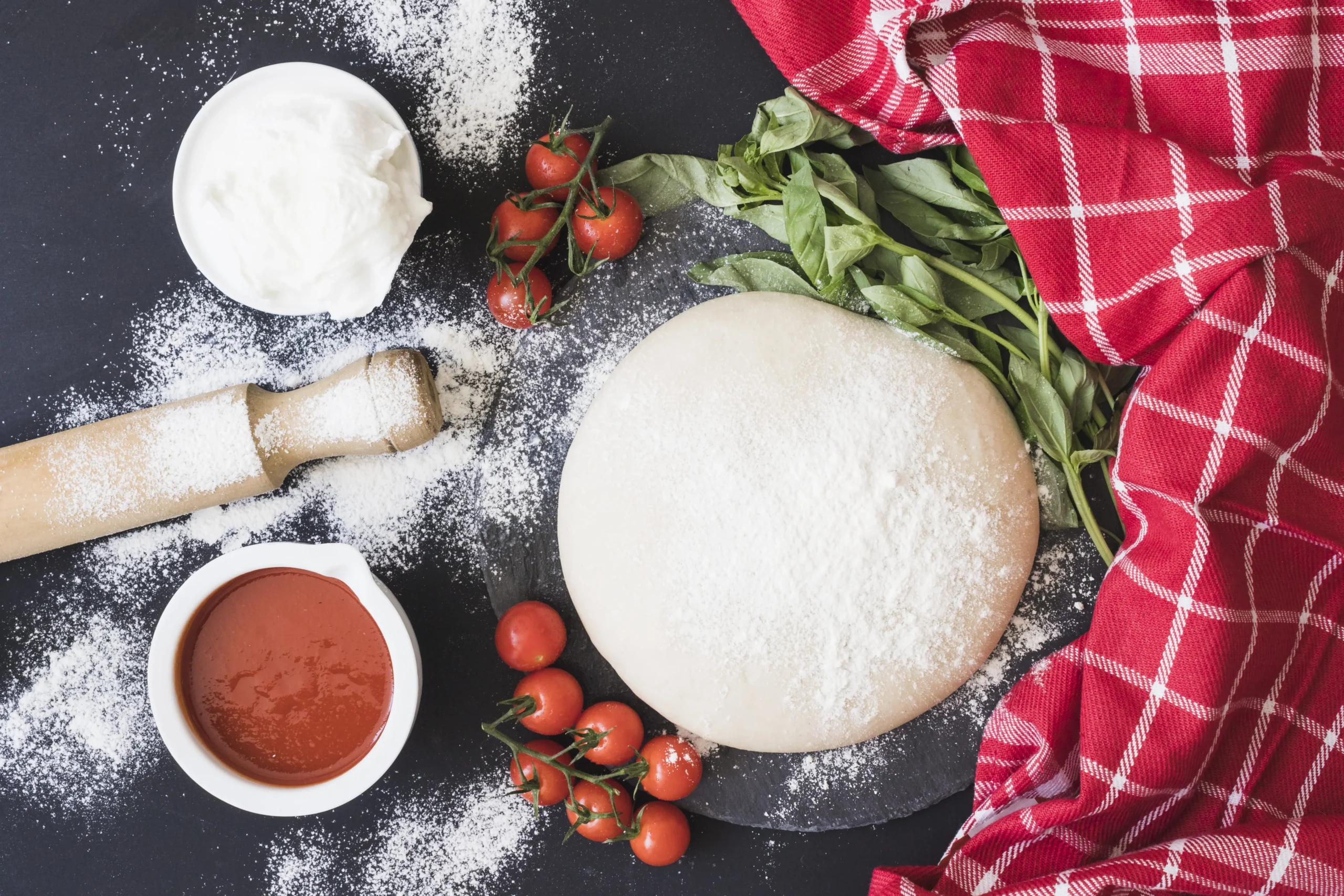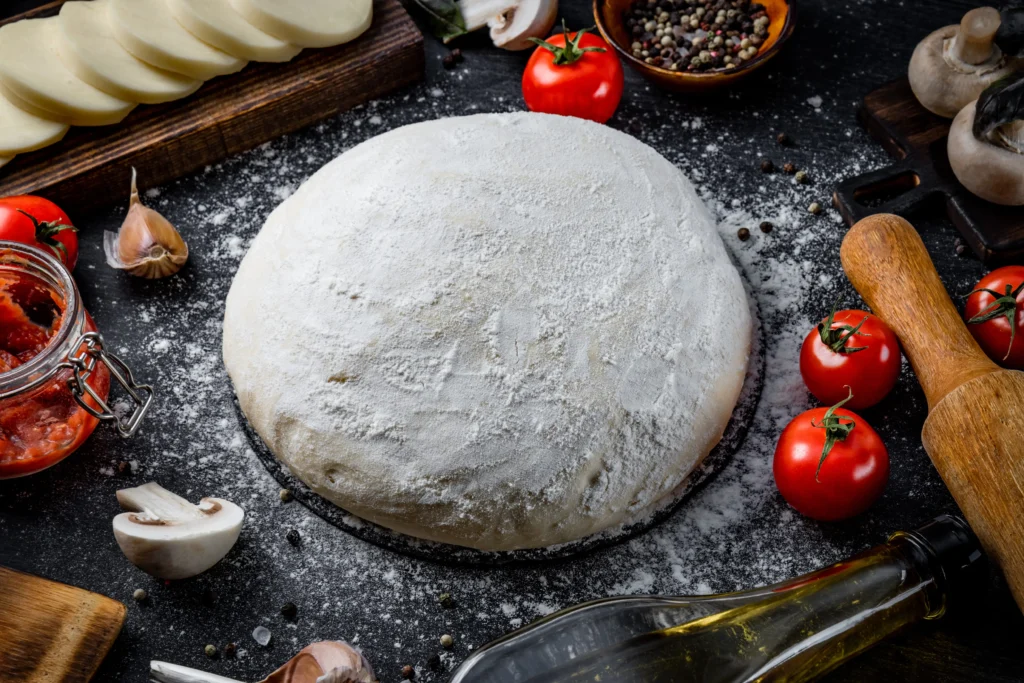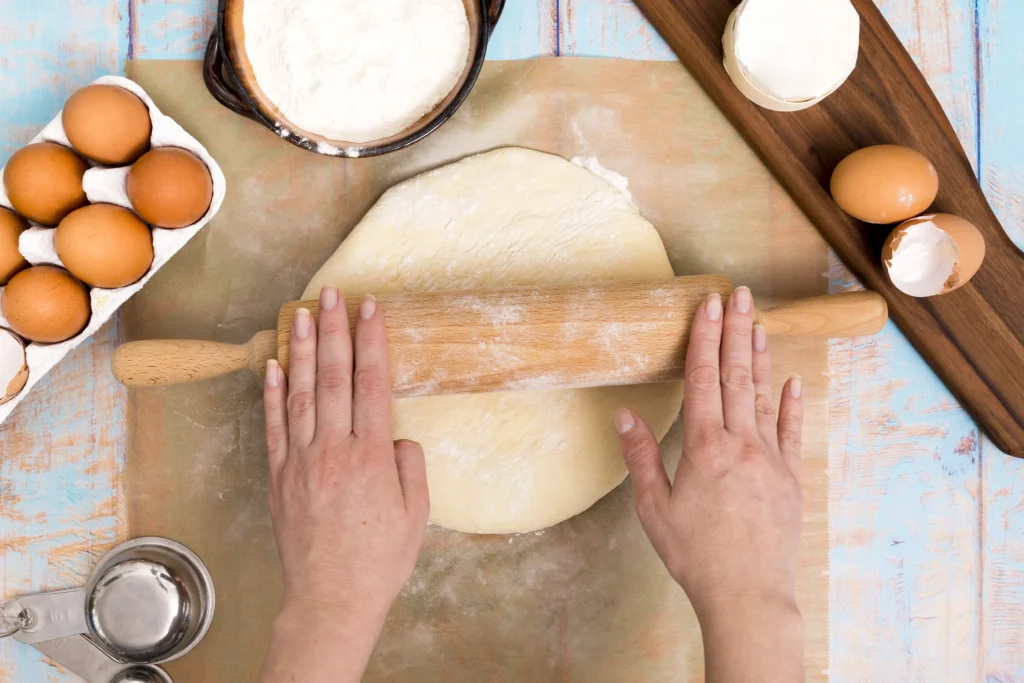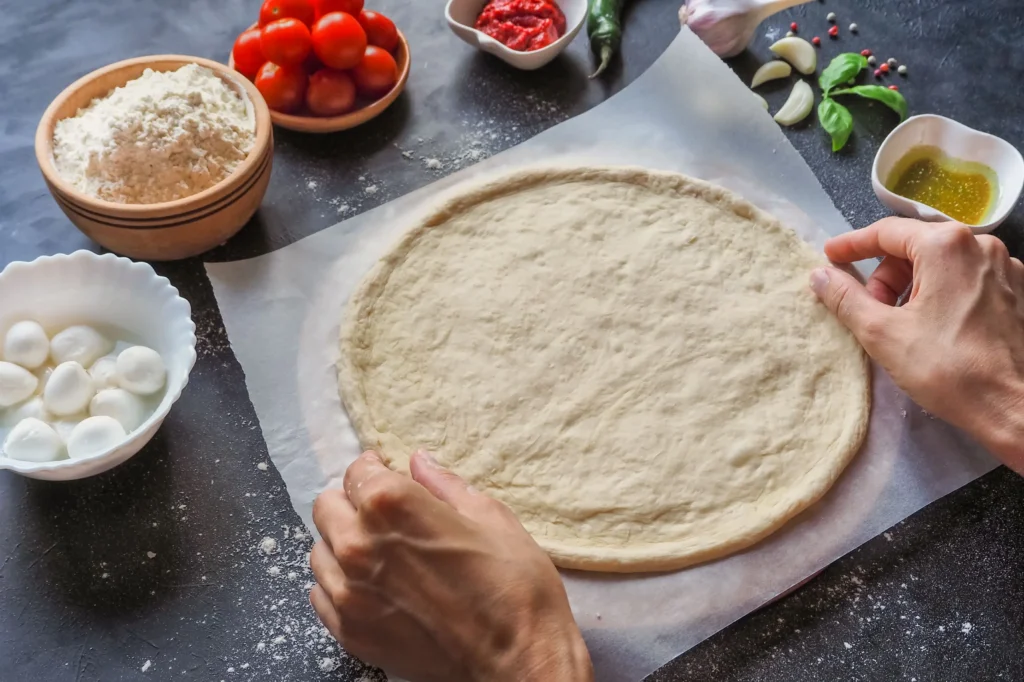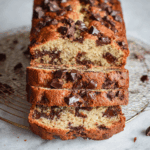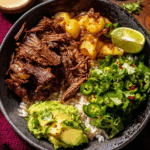00 Flour Pizza Dough
00 flour, also known as “doppio zero” flour, is the gold standard for making authentic Italian pizza dough. Originating from Italy, this finely ground wheat flour is celebrated for its high elasticity and gluten content, making it perfect for creating pizzas with a delicate, airy crust.
Understanding 00 Flour
- What is 00 Flour?: 00 flour is a type of Italian wheat flour, milled to an extra fine consistency. It’s classified based on the Italian grading system, where ’00’ refers to the finest texture.
- Why Choose 00 Flour for Pizza Dough?: The high gluten content in 00 flour results in a dough that’s stretchy and strong, ideal for thin-crust pizzas. It also contributes to a light, airy texture in the baked crust.
- The Difference Between 00 Flour and All-Purpose Flour: Unlike all-purpose flour, 00 flour has a lower absorption rate, meaning it requires less water. This unique characteristic contributes to the crispy yet chewy texture of the pizza crust.
The Basics of 00 Flour Pizza Dough
- Ingredients Overview: Making pizza dough with 00 flour typically involves a simple combination of flour, water, yeast, and salt. Some recipes may include olive oil for added richness.
- Mixing and Kneading: The process of making the dough involves careful mixing and kneading to develop the gluten structure, which is crucial for the dough’s elasticity.
- Fermentation: Allowing the dough to ferment, either at room temperature or in a refrigerator, is key to developing flavor and texture. This slow fermentation is a signature step in making high-quality pizza dough.
Why 00 Flour is Preferred by Chefs
- Professional Endorsement: Many professional chefs and pizza makers prefer 00 flour due to its ability to create a superior texture and flavor in pizza crusts.
- Versatility in Pizza Styles: While 00 flour is often associated with Neapolitan-style pizzas, it’s also versatile enough to be used in various pizza styles, including New York and Roman.
Unique Characteristics of 00 Flour
- Protein Content: 00 flour typically has a protein content ranging from 11% to 12.5%, which is ideal for developing a strong gluten network. This results in a dough that’s stretchy and able to hold its shape well.
- Fineness of the Grind: The ultra-fine grind of 00 flour creates a silky, smooth dough. This texture is not achievable with coarser flours like all-purpose or bread flour.
- Color and Flavor: 00 flour offers a distinctively light color and a subtle, sweet flavor, contributing to the overall taste and appearance of the pizza crust.
The Process of Making 00 Flour Pizza Dough
- Hydration Ratio: A key aspect of making pizza dough with 00 flour is the hydration ratio. Due to its fine texture, 00 flour can handle a higher hydration level, resulting in a more tender crust.
- Kneading Techniques: Proper kneading is crucial. Gentle kneading is recommended to avoid overworking the dough, which can lead to a tough crust.
- Resting and Proofing: Allowing the dough to rest and proof adequately is important for flavor development and texture. 00 flour dough benefits from a longer proofing time at a controlled temperature.
Advantages of Using 00 Flour in Pizza Dough
- Tender Crust: 00 flour yields a crust that is tender and light, with a beautiful balance of chewiness and crispiness.
- Better Handling: The dough made from 00 flour is easier to handle and shape, making it a favorite among both professional chefs and home cooks.
- Enhanced Flavor: The subtle flavors of 00 flour enhance the overall taste of the pizza, allowing the toppings to shine through.
The Science of Dough Fermentation
- Role of Yeast in Fermentation: Yeast is a pivotal ingredient in pizza dough. It consumes the sugars in the 00 flour, producing carbon dioxide and alcohol, which cause the dough to rise and develop flavor.
- Impact of Fermentation Time: The length of fermentation significantly influences the texture and taste of the pizza crust. Longer fermentation allows for more complex flavor development and a lighter, airier crust.
- Temperature Control: The temperature during fermentation is critical. Warmer temperatures speed up the fermentation, while cooler temperatures slow it down, offering more control over flavor development.
Fermentation with 00 Flour
- Absorption and Fermentation: Due to its fine grind, 00 flour absorbs water differently compared to other flours, impacting the rate and efficiency of fermentation.
- Gluten Development: The protein content in 00 flour aids in developing a strong gluten network during fermentation, which is essential for a good pizza crust.
- Fermentation Techniques: Various techniques, such as cold fermentation in the refrigerator or room temperature proofing, can be employed depending on the desired outcome.
Benefits of Proper Fermentation
- Improved Digestibility: Properly fermented dough is easier to digest. The fermentation process breaks down complex carbohydrates, making them more digestible.
- Enhanced Flavor and Texture: Fermentation contributes to a deeper flavor profile and a desirable texture in the pizza crust, making it crucial for high-quality pizza.
- Better Crust Formation: Good fermentation leads to a crust that is crispy on the outside and soft on the inside, a hallmark of excellent pizza.
The Art of Kneading Pizza Dough
- Purpose of Kneading: Kneading develops the gluten network in the dough, which is essential for elasticity and structure. With 00 flour, the goal is to achieve a balance between strength and tenderness.
- Techniques for Kneading: There are various kneading techniques, such as hand kneading or using a stand mixer. Each method affects the dough’s texture and should be chosen based on the desired outcome.
- Kneading Time: The kneading time for 00 flour dough is crucial. Over-kneading can result in a tough crust, while under-kneading leads to a lack of structure.
Resting and Proofing the Dough
- Importance of Resting: After kneading, resting the dough allows the gluten to relax and the yeast to start fermenting, both of which are essential for a good pizza base.
- Bulk Fermentation vs. Individual Proofing: Dough can either be fermented in bulk before dividing or divided into balls and then proofed. Each method has its own impact on the final crust.
- Optimal Proofing Conditions: Temperature and humidity play a significant role in proofing. The right conditions lead to a well-risen dough that’s full of flavor.
Achieving the Perfect Texture
- Texture Goals: The aim is to create a dough that is soft yet strong, capable of stretching thinly without tearing, and producing a crust that’s crispy on the outside and airy on the inside.
- Troubleshooting Texture Issues: Common issues like a too dense or too brittle crust can often be rectified by adjusting kneading time, resting periods, or hydration levels.
- Role of 00 Flour in Texture: The fine grind and protein content of 00 flour are key to achieving the classic Neapolitan pizza texture – light, tender, and with the perfect chew.
Understanding Hydration in Pizza Dough
- What is Hydration?: Hydration refers to the ratio of water to flour in the dough. This ratio is crucial in determining the dough’s texture, handling, and the final crust’s characteristics.
- Hydration Levels for 00 Flour: 00 flour can handle higher hydration levels due to its fine texture, which allows for a more tender and airy crust.
- Balancing Hydration: Finding the right balance of hydration is essential. Too much water can make the dough sticky and hard to handle, while too little can result in a dense crust.
Hydration Techniques and Tips
- Gradual Addition of Water: When mixing the dough, it’s advisable to add water gradually. This allows the 00 flour to absorb the water evenly, leading to a more consistent dough.
- Adjusting for Ambient Conditions: The required hydration level can vary depending on humidity and temperature. It’s important to adjust the water content accordingly.
- Testing Dough Consistency: The dough should be tacky but not overly sticky. Testing the dough during the mixing process can help achieve the ideal consistency.
Impact of Hydration on Pizza Dough
- Texture and Flavor: Proper hydration contributes to a light and airy texture in the crust, while also enhancing the dough’s flavor.
- Dough Handling and Extensibility: Well-hydrated dough made with 00 flour is more extensible and easier to shape, ideal for creating thin-crust pizzas.
- Baking Characteristics: The hydration level influences how the dough bakes. Higher hydration can lead to a more open crumb and a crispier crust.
Understanding Baking Dynamics
- Oven Temperature: High temperatures are crucial for baking pizzas made with 00 flour. This ensures a quick bake, which is key to achieving a crispy exterior and a soft, airy interior.
- Baking Duration: The baking time for 00 flour pizza dough is typically short due to high oven temperatures. It’s important to monitor the pizza closely to prevent over-baking.
- Preheating the Oven: A thoroughly preheated oven is essential. For home ovens, using a pizza stone or steel can help mimic the effects of a professional pizza oven.
Baking Techniques for 00 Flour Dough
- Using a Pizza Stone or Steel: These tools help achieve a uniform crust bottom and a well-baked top. They absorb and radiate heat evenly, essential for a perfect crust.
- Broiling for Finishing: Some home bakers use the broiler for the last minute of baking to add color and texture to the top of the pizza.
- Rotating the Pizza: Rotating the pizza halfway through baking ensures an evenly cooked crust, especially in home ovens where heat distribution might be uneven.
Impact of Baking on Pizza Dough
- Crust Development: The intense heat of the oven helps in rapid crust formation, which is characteristic of Neapolitan-style pizzas.
- Texture and Flavor: Proper baking techniques enhance the natural flavor of the 00 flour and contribute to a crust that is crispy on the outside while remaining tender and airy on the inside.
- Browning and Char: The high temperatures lead to slight charring on the crust, adding to the pizza’s rustic appeal and flavor complexity.
Choosing the Right Toppings
- Simplicity is Key: With 00 flour pizza crust, less is often more. Opting for a few high-quality ingredients allows the delicate flavor of the crust to shine through.
- Fresh and Quality Ingredients: Fresh, high-quality toppings complement the 00 flour crust. Ingredients like fresh mozzarella, basil, and ripe tomatoes are classic choices.
- Balancing Flavors and Textures: The toppings should balance each other in flavor and texture. Consider a mix of savory, sweet, and tangy ingredients for a well-rounded taste.
Applying Toppings to 00 Flour Pizza Dough
- Layering Techniques: How you layer the toppings can affect the baking process. For example, cheese beneath the sauce can prevent the dough from becoming soggy.
- Quantity of Toppings: Too many toppings can weigh down the delicate 00 flour crust. It’s important to use a light hand when adding toppings.
- Pre-cooking Certain Toppings: Some ingredients, like vegetables or certain meats, might need to be pre-cooked to ensure they are done at the same time as the crust.
Impact of Toppings on the Final Pizza
- Texture Considerations: The right amount and type of toppings ensure that the crust remains crispy and doesn’t get soggy.
- Flavor Enhancement: Toppings should enhance, not overpower, the subtle flavors of the 00 flour crust. The aim is to create a harmonious blend of flavors.
- Visual Appeal: The toppings also contribute to the visual appeal of the pizza. A well-balanced topping arrangement can make the pizza more inviting.
Creative Recipe Ideas with 00 Flour Dough
- Incorporating Herbs and Spices: Adding herbs like rosemary or basil, or spices directly into the dough can infuse it with subtle flavors, enhancing the overall taste of the pizza.
- Whole Wheat and 00 Flour Blend: Mixing 00 flour with whole wheat flour can create a dough with a nuttier flavor and more fiber, while still retaining the desirable texture of 00 flour.
- Infused Oils in Dough Making: Using garlic-infused or chili-infused olive oil in the dough adds a new flavor dimension and can elevate the taste of the pizza.
Variations in Dough Preparation
- Sourdough 00 Flour Pizza Dough: Using a sourdough starter instead of yeast brings a tangy depth to the pizza dough, along with improved digestibility.
- Cold Fermentation: Extending the fermentation time by refrigerating the dough can develop more complex flavors and improve the texture of the crust.
- Flavored Crusts: Experimenting with different flavors, such as garlic or cheese incorporated into the crust, can make for a unique and tasty pizza experience.
Exploring Different Pizza Styles with 00 Flour
- Neapolitan-Style Pizza: Traditional thin-crust pizza that showcases the light, airy texture of 00 flour.
- New York-Style Pizza: With a slightly thicker crust, this style allows for more toppings and a chewier texture, which can be achieved with a 00 flour blend.
- Focaccia with 00 Flour: Transforming the 00 flour dough into a thick, soft focaccia bread is a delightful variation that emphasizes the flour’s versatility.
Advanced Dough Handling Techniques
- Windowpane Test: This technique involves stretching a small piece of dough to see if it can become thin enough to transmit light without tearing, indicating well-developed gluten.
- Autolyse Method: Allowing the flour and water to rest before adding yeast and salt can improve gluten development and dough hydration, leading to a more tender crust.
- Dough Folding: Instead of traditional kneading, folding the dough over several intervals can develop gluten strength while maintaining a tender texture.
Temperature and Timing Tips
- Room Temperature Proofing: Proofing the dough at room temperature for a shorter period can yield a crust with a lighter texture and a more pronounced yeast flavor.
- Refrigeration for Flavor Development: Long, slow fermentation in the refrigerator enhances the flavor complexity of the dough and improves its texture.
- Dough Temperature: The temperature of the dough when it goes into the oven affects the final bake. Room temperature dough typically bakes more evenly.
Mastering the Perfect Crust
- Thickness Variations: Experimenting with different dough thicknesses can help you find your preferred balance between crispy and chewy.
- Oven Spring Maximization: Understanding how to maximize oven spring – the rapid rise of the dough due to heat – is crucial for achieving a light and airy crust.
- Handling Post-Bake: Allowing the pizza to rest for a minute or two after baking can settle the crust, preventing it from becoming soggy from the toppings.
FAQs- Frequently Asked Questions about Pizza Dough
Is 00 Flour Better for Pizza Dough?
00 flour is often considered superior for pizza dough, especially for Neapolitan-style pizzas. Its high gluten content and fine texture create a dough that is both stretchy and capable of forming a light, crispy crust.
Can You Mix All-Purpose Flour with 00 Flour for Pizza Dough?
Yes, you can mix all-purpose flour with 00 flour. This blend can adjust the protein content and dough handling characteristics, which might be helpful in home ovens that can’t reach high commercial oven temperatures.
What is the Difference Between 00 and Type 0 Flour?
The main difference lies in the grind size. 00 flour is more finely ground than type 0 flour. This results in a silkier texture and a dough that’s more extensible, making it better suited for thin-crust pizza.
Can You Make Bread with 00 Pizza Flour?
While 00 flour is primarily used for pizza, it can also be used for bread. However, expect a different texture in the bread due to the flour’s fine grind and protein content, which may result in a denser loaf.
Finally and to conclude, throughout our article, we’ve explored the various aspects of making pizza dough with 00 flour. From understanding the flour’s unique properties, the science of fermentation, and kneading techniques, to hydration, baking methods, and topping selections, we’ve covered the essential elements for creating the perfect pizza crust.
00 flour stands out for its ability to produce a dough that’s both flavorful and versatile, adaptable to various pizza styles. Whether you’re a professional chef or a home cook, mastering pizza dough with _00 flour can elevate your culinary creations, offering a taste of authentic Italian pizza right in your kitchen.
Remember, the key to perfect pizza lies not just in the ingredients but in the passion and patience with which you combine them. Happy baking!

